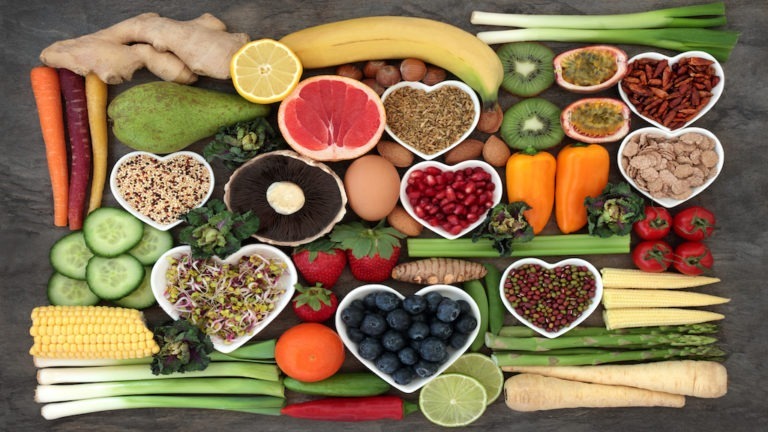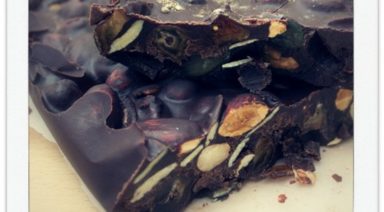Top 10 Cleansing Foods for a Natural Detox

Feeling lethargic and constantly bloated no matter how much you exercise? It may be time to jumpstart your body and give it a fresh start with an all-natural detox. Toxins are everywhere – from household cleaners to deodorants – and they can have a negative impact on your health. From getting sick more often to never losing that last 5 lbs., toxin build-up causes your body to waste valuable energy on basic functions.
While some may say the more you sweat, the more toxins you release, this isn’t necessarily true. More exercise may help you lose weight and feel better, but toxin removal only comes when you flush your body’s system from the inside out. By substituting a few of your regular snacks with “cleansing foods,” your body will function more effectively and thank you in the long run.
Recently, detox pills and powders have become all the rage, but they’re unsustainable in the long run. They may help you lose weight fast, but your body will ultimately rebound and they may have harmful long-term effects. The key to success is working healthier choices into your daily routine until they become second nature.
Natural detox foods contain molecules that cling onto toxins and carry them out of your body. While all cleansing foods have an overall purifying effect, specific foods are extra helpful to specific areas of the body. Natural detox foods are everywhere and you might just be surprised at how tasty they can be. Take a look at our top 10 favorite cleansing foods and get your body back on track.
Beets
How they help:
Although beets have fairly high sugar content compared to other vegetables, a few beetroots can go a long way. One of our favorite natural detox foods, beets contain a group of antioxidants called betalains, which are excellent for detoxifying your body, and more specifically your liver. Beets also contain a high concentrate of betaine, which helps to reduce liver inflammation.
The antioxidants found in beets support the liver’s phase 2 cleansing when toxins are chemically transformed into a water-soluble form that can be excreted through urine. On top of this, beets are also high in immune-boosting vitamin C, vitamin B folate, fiber, potassium and manganese. Just a few benefits you might see are reduced blood pressure, reduced inflammation, enhanced stamina, and increased liver function.
How to use them:
More than just a tasty side dish, beets can be worked into your diet in a number of ways. Trying adding beet juice to your morning smoothie or as a mid-workout drink to help keep your energy up. If you want to go the more traditional route, a cup of cooked beets contains only about 60 calories and with a healthy dose of fiber, will keep you feeling full.
Garlic
How it helps:
Garlic contains a little bit of everything our bodies need. Rich in manganese, vitamin B, vitamin C, and fiber, garlic is low in calories and high in nutrients. The main compound found in the pod is Allicin, a component that is known for its anti-viral, anti-bacterial, anti-fungal and anti-oxidant properties. Excellent for your digestive and circulatory systems, fresh garlic is even thought to play a role in preventing food poisoning by killing bacteria such as E. coli and salmonella.
A truly wondrous natural detox food, garlic has been known to help treat everything from skin infections like ringworm and athletes foot to combatting blood clots and lowering cholesterol. It can even help you to lose weight faster by regulating the formation of fat cells.
How to use it:
While garlic powder may have the same pungent odor and taste, it has virtually none of the same healing properties as fresh garlic. Try chopping, mincing or even pureeing fresh garlic and then letting it sit to draw out the full health effects. While some recommend eating a crushed garlic pod every day, we won’t go that far. Simply add enough to flavor your favorite meal and enjoy the benefits of this cleansing food.
Cilantro
How it helps:
Have a fish heavy diet? Worried about toxic heavy metals such as lead or aluminum getting into your system through your water or even air? Cilantro may be your new best friend. While it won’t eliminate heavy metals from your system entirely, cilantro helps to move these toxins from your deepest body stores back into the bloodstream where other agents can more easily push them out of the body.
This fresh-tasting herb is an excellent source of minerals and vitamins such as potassium, calcium, folic acid, Vitamin A, Vitamin C, and Vitamin K. Because of its nutrient-rich makeup, Cilantro is known to help with reducing bad cholesterol, regulating heart rate and blood pressure, and preventing osteoporosis. It also helps to protect your liver and kidneys against oxidative stress, or more simply put, an imbalance between free radicals and the antioxidants that neutralize them.
How to use it:
Cilantro is the Spanish word for coriander leaves, meaning that coriander seeds can also be considered a natural detox food. Fresh cilantro can revive virtually any meal. Not just for pico de gallo or salsa, try adding a bit to your morning smoothie or juice for a delightfully unexpected fresh taste. With so few calories and no cholesterol, this deep-green cleansing food will be your next favorite secret ingredient.
Citrus
How it helps:
Most people are aware that oranges contain high amounts of vitamin C. However, the benefits of other citrus-based natural detox foods aren’t quite as mainstream. Lemons, limes, grapefruits, and oranges are all high in Vitamin C and are great for not only boosting your immune system but also for cleansing your internal organs, specifically your colon and liver. Vitamin C is needed to create a substance called glutathione, which helps the liver to function and create neutralizing anti-oxidants. Citrus also contains a high amount of pectin fiber, which binds to bad cholesterol and heavy metals to carry them out of your system.
How to use it:
Probably the easiest to work into your everyday diet, citrus-based cleansing foods are a simple addition. Try starting off your day with a half of grapefruit for breakfast or a glass of fresh-squeezed orange juice (stay away from the highly-processed juices at the store as these often contain high amounts of sugar and other additives). Or, try freshening up your glass of water with a slice of lemon or lime. While the sound of “citrus-infused water” may conjure up images of an expensive spa, specially designed water bottles make it easy to add the health benefits of any of these citrus foods to your water.
Bentonite Clay
How it helps:
More than just an ingredient for natural healing toothpaste, bentonite clay acts as a “chemical sponge,” and is one of the most effective ways to cleanse your system daily. Composed of volcanic ash and named for the largest known deposit in Fort Benton, Wyoming, this clay amazingly absorbs and binds to heavy metals, bacteria, mycotoxins, radiation, and even pro-inflammatory compounds.
When combined with water, bentonite clay produces an “electrical charge” and rapidly swells open, drawing in and binding toxins. This healing clay also has a high concentration of minerals including calcium, iron, silica, and potassium. With the ability to be used both internally or externally, bentonite clay can help skin and allergy issues, acid reflux, constipation, and even speed up recovery time for skin wounds.
How to use it:
Purchasing bentonite clay can be a little tricky and often confusing. It’s most commonly found at health food stores and comes in a variety of types, some of which may bind to beneficial nutrients or contain harmful compounds. When searching, look for a calcium form and be sure to research whether it comes from a clean source with no risk of toxic contamination.
Calcium forms do not bind to any nutritional vitamins or minerals in the body and will range from a grey to cream color. Beware any bentonite clay that is close to pure white, as these forms are suspect. Try using bentonite clay externally as a mud mask or mix a teaspoon with a glass of water to help balance gut bacteria.
Blueberries
How they help:
More than just a cleansing food, blueberries are the definition of true superfood. Filled with iron, calcium, phosphorous, magnesium, zinc and vitamin K, blueberries can help to lessen tissue-damaging effects of chronic inflammation, block bacteria in the urinary tract, prevent toxins from crossing the blood-brain barrier, maintain and strengthen bone structure, lower blood pressure, and even fight wrinkles.
Vitamin A, vitamin C and various phytonutrients found in blueberries function as powerful antioxidants, which help protect your body against damage from free radicals. Because of antioxidants’ ability to slow tumor growth and lessen inflammation, some studies suggest that blueberries may even help to ward off or slow several types of cancer.
How to use them:
Low in calories, yet high in nutrients, blueberries can be a deliciously healthy addition to your everyday diet. Try starting your day with a cup of fresh blueberries or add them to your smoothie. Compact and filled with fiber, blueberries also make a great snack between meals that keep you feeling full and satiated. If you’re looking to drop some pounds, try replacing your dessert or a sweet treat with a cup of fresh blueberries instead. Their high fiber component will help you to feel full for longer, thereby reducing your urge for late-night snacks, and their natural sweetness will satisfy your craving for sugar.
Cranberries
How they help:
Perhaps best known for their help in preventing urinary tract infections, these natural detox foods boast a long list of cleansing benefits. Cranberries contain high amounts of proanthocyanidins (PACs) and help fight off infection by reducing the ability of certain bacteria to adhere to the urinary tract walls. These same PACs, also help prevent bacteria from binding to teeth and platelets building up in the heart, making cranberries a useful weapon in the war against gum disease and heart disease.
How to use them:
While cranberry juices may be easy and delicious, their overall health benefits are lacking. Some juices may still help to cleanse toxins more effectively, however, it takes a large number of cranberries to reap the full rewards. In addition, in order to make the juices appealing, the concentration of actual cranberries is severely lowered. You’re unlikely to see any benefits by the time it reaches your bladder. Instead, try working dried cranberries into your homemade trail mix or include a handful of frozen cranberries into your smoothie for a tart treat.
Chia Seeds
How they help:
More than just a sprouting plant for your office cubicle, chia seeds are jam-packed with fiber, calcium, iron, phosphorous and antioxidants. A lesser-known fact about these cleansing foods, chia seeds are able to hold up to 12 times their weight in water and if soaked for over 30 minutes, will form a gel. When in your stomach, this gel reaction forms a barrier and slows down your digestion to create a sustained release of energy.
While chia seeds do contain a high amount of carbohydrates, the majority of those carbs are actually fiber. According to the American Dietetic Association, one serving of chia seeds can provide the recommended daily amount of fiber. This soluble fiber acts as a prebiotic in order to support the growth of probiotics in the gut.
So, what does this all mean? Basically, chia seeds will increase your fullness and give you a steady release of energy over a prolonged period of time to help you consume fewer calories, all while promoting healthier digestion and balancing the bacteria in your gut. On top of this, chia seeds also contain the ability to reverse inflammation, lower blood pressure, reverse oxidative stress, and help your body absorb vitamins.
How to use them:
Chia seeds have a very neutral taste, making them easy to sprinkle onto just about any food. Toss them into your favorite salad for added crunch or roll them onto the top of your sandwich for a unique and pleasant texture changeup.
Apples
How they help:
An apple a day keeps the doctor away. More than just a nursery school rhyme, these are words to live by. Similar to grapefruits and oranges, apples contain a high amount of pectin, which binds to bad cholesterol and heavy metals, eliminating them from the body and cleansing the intestines. By reducing your cholesterol, apples aid in everything from preventing gallstones to increasing heart health. Apples also contain an antioxidant called quercetin, which helps boost and fortify your immune system and even deliver more oxygen to the lungs for increased endurance.
How to use them:
Working apples into your diet isn’t rocket science. Sub out your afternoon snack for a fresh apple or add some slices to your juice or smoothie. However, dried apples might be a welcomed changeup. Try snacking on them alone or adding dried apples to your homemade trail mix. Their natural sweetness is the perfect complement to the tart dried cranberries mentioned earlier.
Kale
How it helps:
Kale is one fad that we can definitely get on board with. High in antioxidant compounds, iron, fiber and more, Kale can help with anything from neutralizing compounds found in cigarette smoke to strengthening liver function. One of our favorite cleansing foods, did you know that kale has more iron per calorie than beef?
This iron concentration helps to support cell growth, liver function, oxygen transportation, and hemoglobin formation. Mix this with Kale’s high level of antioxidants and you’ve got the perfect recipe for protecting heart health, lowering blood pressure, and reducing inflammation. Given Kale is high in fiber and water content, it also helps to prevent constipation and promote a healthy digestive tract to push toxins out faster.
How to use it:
How to work kale into your diet is wholly dependent on your personal likes and dislikes of its taste and texture. If you don’t mind the taste and texture, massage a cup of kale with a light salad dressing to replace your normal iceberg lettuce or arugula. If you find it too tough while raw, try sautéing it in pan with a little olive oil and garlic to soften it up and mask the taste.
Stem Cells From One's Own Body Show Efficacy in Treating Pain

Stem cell therapy is still a relatively new concept that few understand, but it continues to garner a lot of support and promise — especially for medical problems that have traditionally been very difficult to treat. In his fascinating discussion with Open Minds host Regina Meredith, naturopathic doctor Harry Adelson N.D. reveals a new way to address pain by using stem cells as curative agents. This may come as a welcome idea for at least a fifth of the population, who suffer from chronic pain that affects quality of life, the ability to work, sleep patterns, and more.
According to the Mayo Clinic stem cells create other cells with specialized functions, and “[u]nder the right conditions in the body or a laboratory, stem cells divide to form more cells called daughter cells. These daughter cells either become new stem cells (self-renewal) or become specialized cells (differentiation) with a more specific function, such as blood cells, brain cells, heart muscle cells or bone cells. No other cell in the body has the natural ability to generate new cell types.”
Adelson, says treatment with stem cells can help treat musculoskeletal pain and increase energy using cells from one’s own bone marrow and fat to prompt regeneration. Citing his own use of stem cells on his road to recovery from injury and pain, Adelson says how regenerative therapy using biological tissues found in the human body can restore normalcy to someone living with pain and suffering.
One of the more exciting aspects of stem cell therapy is that each of us can create our own cells to heal ourselves. Emerging evidence suggests that adult stem cells can not only replicate, but also create various other types of cells. For example, bone marrow stem cells may be able to create bone or heart muscle cells.
Adelson is highly experienced when it comes to using stem cells for pain treatment, having performed numerous procedures using bone marrow combined with adipose (bodily fat) stem cells. He’s also injected more than a thousand intervertebral discs with stem cells.
Adelson’s excitement for stem cell therapy began with an accident as a young man, while rock climbing in the early 1990s. He was in naturopathic school at the time, when an injury to his shoulder set him off in a new direction, leading him to pursue an alternative to traditional surgery and injections for pain treatment. After receiving his naturopathic degree, Adelson discovered the potential of stem cell therapy.





































